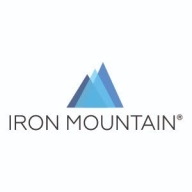

Teradata and Iron Mountain Connect are strong contenders in the data management domain. Teradata has an edge with its data management functions, but Iron Mountain Connect excels in document management. Teradata is viewed as more cost-effective compared to Iron Mountain Connect, despite the latter's comprehensive features.
Features: Teradata offers high-performing analytics, advanced data processing, and cost-effectiveness. Iron Mountain Connect stands out for secure document storage, easy access to records, and comprehensive document management.
Ease of Deployment and Customer Service: Iron Mountain Connect ensures streamlined deployment and attentive customer service. Teradata's deployment can be more complex, requiring extensive assistance, with users finding Iron Mountain's support more accessible.
Pricing and ROI: Teradata has an attractive initial setup cost with quick ROI due to its analytics capabilities, while Iron Mountain Connect, despite higher upfront costs, provides lasting value through its document management features.
| Product | Market Share (%) |
|---|---|
| Teradata | 0.5% |
| Iron Mountain Connect | 0.7% |
| Other | 98.8% |

| Company Size | Count |
|---|---|
| Small Business | 28 |
| Midsize Enterprise | 13 |
| Large Enterprise | 52 |
Teradata is a powerful tool for handling substantial data volumes with its parallel processing architecture, supporting both cloud and on-premise environments efficiently. It offers impressive capabilities for fast query processing, data integration, and real-time reporting, making it suitable for diverse industrial applications.
Known for its robust parallel processing capabilities, Teradata effectively manages large datasets and provides adaptable deployment across cloud and on-premise setups. It enhances performance and scalability with features like advanced query tuning, workload management, and strong security. Users appreciate its ease of use and automation features which support real-time data reporting. The optimizer and intelligent partitioning help improve query speed and efficiency, while multi-temperature data management optimizes data handling.
What are the key features of Teradata?
What benefits and ROI do users look for?
In the finance, retail, and government sectors, Teradata is employed for data warehousing, business intelligence, and analytical processing. It handles vast datasets for activities like customer behavior modeling and enterprise data integration. Supporting efficient reporting and analytics, Teradata enhances data storage and processing, whether deployed on-premise or on cloud platforms.
We monitor all Backup and Recovery reviews to prevent fraudulent reviews and keep review quality high. We do not post reviews by company employees or direct competitors. We validate each review for authenticity via cross-reference with LinkedIn, and personal follow-up with the reviewer when necessary.